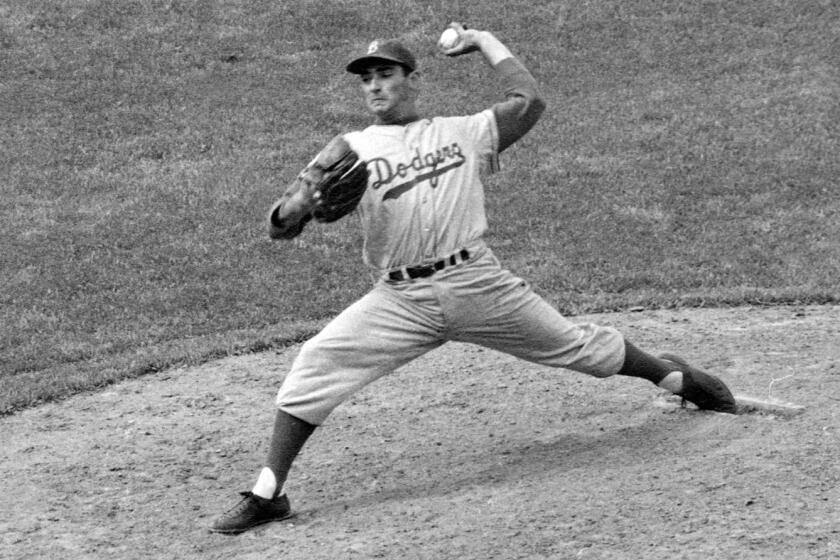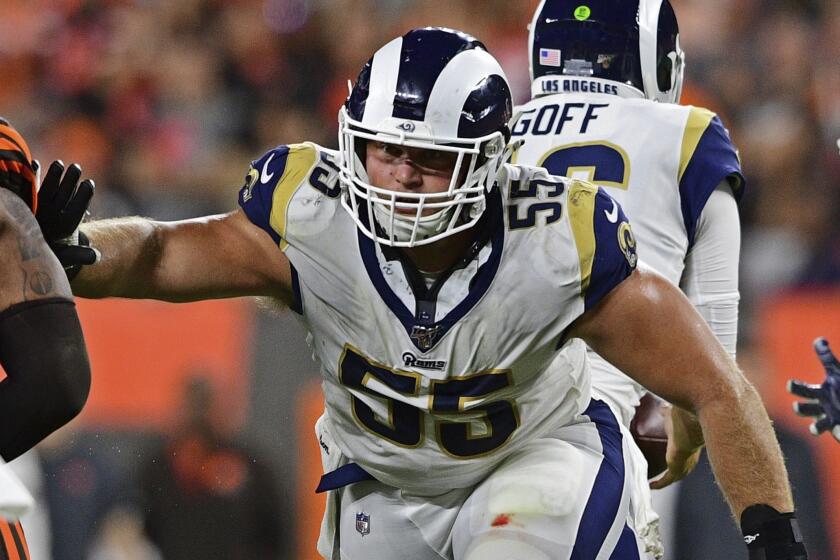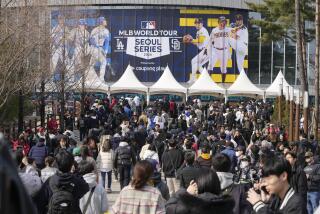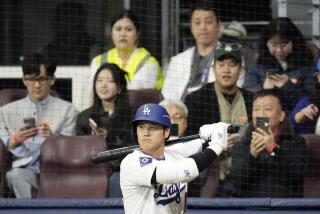Korean Baseball Organization is back on the field, but the turf is precarious
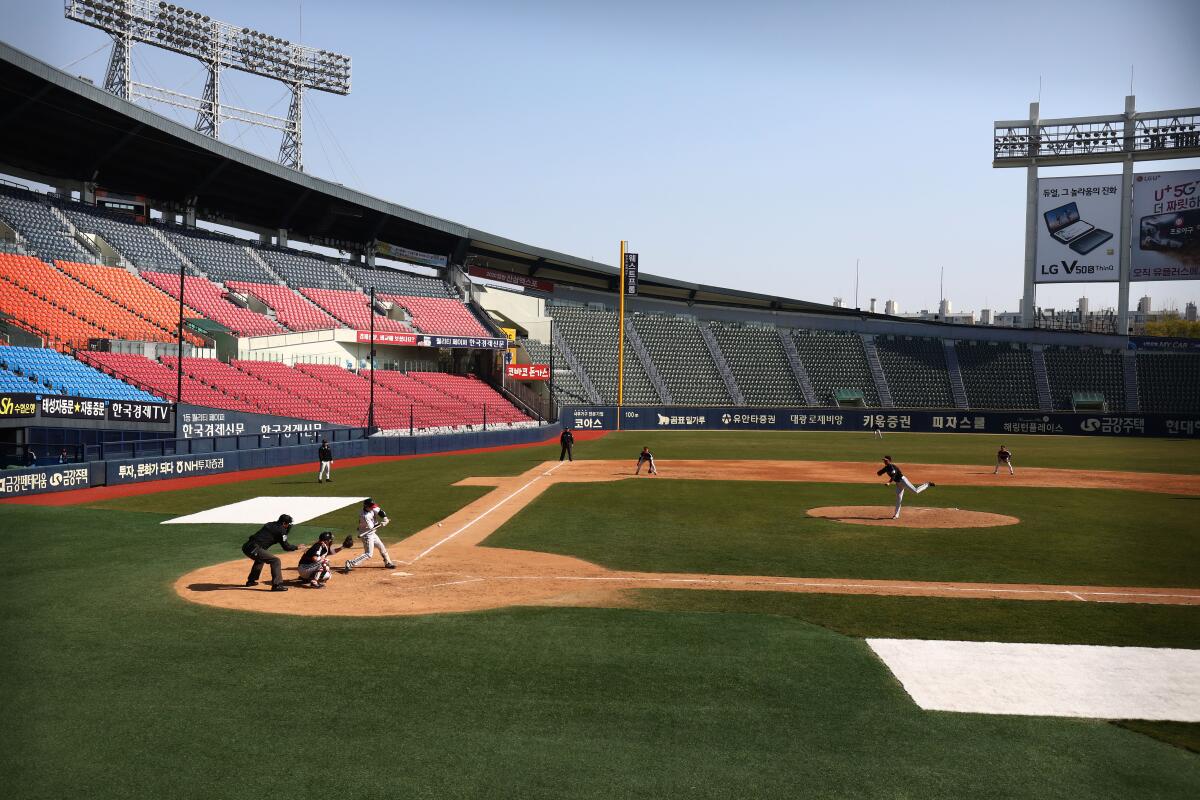
- Share via
The idea that the Korean Baseball Organization can provide a path for Major League Baseball in navigating the tricky logistics of jump-starting a season would have more merit if the league had firm footing.
South Korea may be far ahead of the curve in containing the novel coronavirus, so much so that the 10-team KBO is currently playing intrasquad games with an eye toward an early May start to the season. But the foundation on which the KBO hopes to build a season seems as unstable as it does in the U.S.
“I don’t know when the season will start, because one outbreak, and the KBO could be shut down,” former Angels catcher Hank Conger said by phone Tuesday from Busan, South Korea, where the Huntington Beach native is in his first season as catching instructor for the KBO’s Lotte Giants.
“They’re so cautious with everything that I truly believe if one player on one team gets it, they could delay it for another month, and everything just falls apart. You know how easily it can spread inside a clubhouse.”
That KBO teams are on the field while every U.S. sports league is shut down is a testament to South Korea’s successful efforts — at least, compared to most other countries — to mitigate the impact of COVID-19.
Who is the biggest icon in L.A. sports history? Readers get to decide.
A network of laboratories in the country began preparing in February for the possibility of widespread transmissions. By early March, an average of 12,000 patients were tested a day, many at free, same-day mobile testing stations and the 50 or so drive-through clinics set up across the country.
As of Tuesday, South Korea had confirmed more than 10,000 coronavirus patients and 192 deaths after having tested more than 350,000 people in two months. Early detection, isolation and treatment have translated into a mortality rate of less than 1%, compared with more than 3% worldwide.
The country, with a population of 51 million, reported fewer than 50 new coronavirus cases Sunday and Monday, the lowest daily upticks since infections began surging Feb. 21. At the peak, Feb. 29, more than 900 new cases were reported in one day.
In the U.S., with more than six times the population of South Korea, close to 400,000 infections have been reported and nearly 13,000 people have died as of Tuesday.
“The biggest thing here, is when the virus broke out, the whole country put a pretty strict lock-down on everything,” Conger said. “The government issues a daily text message to tell people that, ‘Hey, there’s an outbreak here, an outbreak there, try to stay inside as much as possible.’ They were super proactive about it.”
The Giants were in Australia for spring training when the pandemic broke out in South Korea, delaying the team’s return by two weeks, until mid-March.
By then, all major public facilities, including schools and gyms, were closed. People were advised to avoid public gatherings. Strict social distancing measures were put in place. Protective face masks were mandatory as Conger learned when he tried to open a Korean bank account.
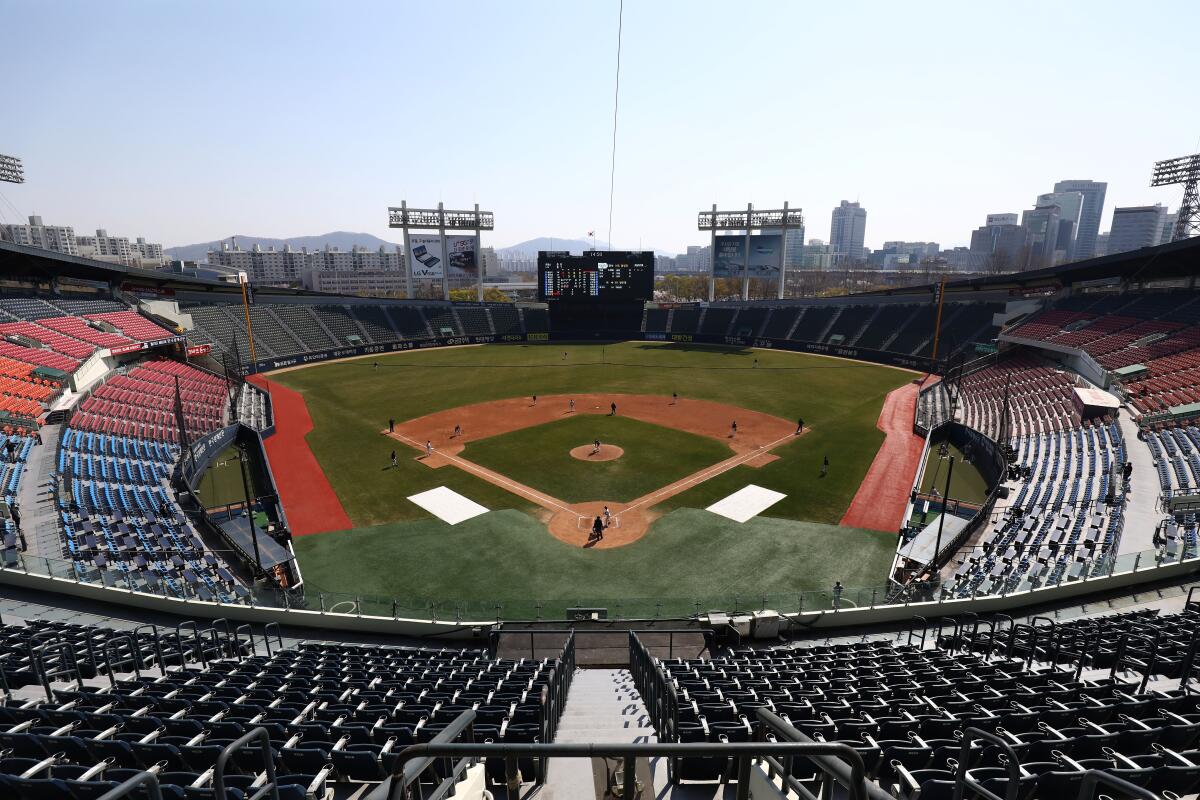
“I forgot my mask because I came straight from the field with my translator,” said Conger, who played with the Angels from 2010-2014 and retired after 2016. “I walked in, and everyone literally was staring at me, the workers, the people who were waiting in line for a bank teller.
“One of the ladies came up and told my translator, ‘Hey, I’m sorry but we’re pretty strict right now, and he needs to wear a mask if he wants to enter the building.’ So I had to walk a half mile back to the baseball field to get my mask.”
The start of the 144-game KBO season, originally scheduled for March 28, has been pushed back several times. The plan now is to begin a six-game exhibition season April 21 and the regular season in early May.
The Giants, whose roster includes two former major league pitchers — Dan Straily and Adrian Sampson — have been practicing six days a week and playing three or four intrasquad games, which are streamed on YouTube.
As they enter 26,800-seat, open-air Sajik Baseball Stadium, players and team employees walk through an infrared camera that measures body temperature.
When a Giants player had a slight fever March 24, practice was canceled and the rest of the team was sent home to self-isolate. An immediate test on the player for COVID-19 was negative.
Players and coaches wore face masks for the first week of workouts and games, but most scrapped them in late-March.
“We were trying to be super cautious about everything, but a lot of guys were having a tough time breathing,” Conger said. “It’s a distraction, especially when you’re at the plate and you can feel your breath bouncing back onto your face.”
KBO officials are discussing the possibility of opening the season without fans. Or they could limit the number of fans so they can socially distance themselves from one another.
A look at athletes, coaches and others in the sports world who have tested positive of the coronavirus.
The Giants have one of the most passionate followings in the KBO, where fans often sing and chant throughout games, but Conger can’t imagine folks from this port city of 3.5 million packing the stadium anytime soon.
“Even with temperature checks, that’s a lot of people being right next to each other,” said Conger, whose parents were born in Korea. “Especially with the Korean culture, how everyone’s very cautious.”
There hasn’t been a positive COVID-19 case yet among KBO players or employees, but each step toward the season and a return to something resembling normalcy still seems precarious.
The start of the Nippon Professional Baseball season in Japan, scheduled for April 24, is now on hold after three players on the Hanshin Tigers tested positive. Could the KBO suffer the same fate with a positive test?
“At that point, do you have to test all the other players?” Conger said. “Because you don’t really know how long that guy had it. That’s the biggest scare on everyone’s mind now, if a player or a coach gets it. That’s when I think a lot of stuff might fall apart.”
More to Read
Go beyond the scoreboard
Get the latest on L.A.'s teams in the daily Sports Report newsletter.
You may occasionally receive promotional content from the Los Angeles Times.

